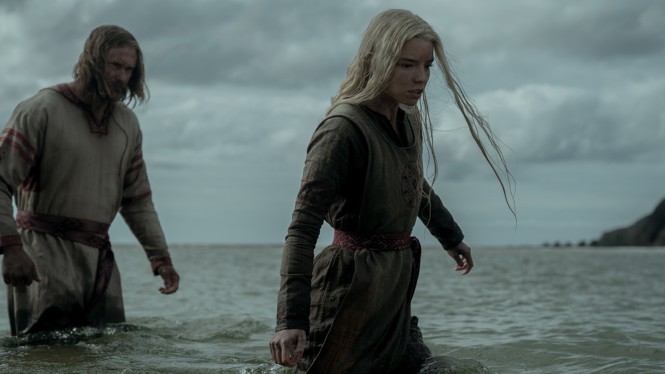
The magic of Robert Eggers’s breakout first film, The Witch, a horror fable about a Puritan family besieged by supernatural forces, lay in its authenticity. Not from the close attention to period detail, though that was itself impressive, but from the earnestness of its tone, which presented every supernatural element as matter-of-factly as the grim realities of corn farming in 17th-century New England. That same practicality pervades Eggers’s newest work, The Northman, a violent Viking tale of loss and revenge. The film beckons you like a shaggy-haired stranger at a mead hall about to spin a yarn, one untouched by any modern awareness.
In The Witch and his loopy next film, The Lighthouse, Eggers triumphed in generating the kind of thick, transporting atmosphere that envelops a whole theater. The Northman similarly plunges the viewer into a world that seems impressively alien. This is not a clichéd Viking landscape of lords in horned helmets who might look most at home on the cover of a heavy-metal album. Our hero, the deposed 10th-century prince Amleth (Alexander Skarsgård), is a mud-streaked terror who looks as though he just crawled out of the ground, thirsty for vengeance against the man who killed his father; the crux of the narrative is whether Amleth can cling to a morsel of humanity as he tries to carry out that mission.
[Read: Female freedom and fury in The Witch]
The original Scandinavian legend was an inspiration for Shakespeare’s Hamlet, and the basic plot of The Northman may therefore sound familiar. As a young boy, Amleth sees his father, King Aurvandil (Ethan Hawke), get murdered by his uncle Fjölnir (Claes Bang), who then seizes the throne and marries Amleth’s mother, Queen Gudrún (Nicole Kidman). Amleth escapes, and although his path back to Fjölnir is circuitous, his enthusiasm for retaliation never dims. Eggers presents Amleth’s quest as both a worthy obsession and an undeniable hindrance. He hones the character into a living weapon, crafted for a singular, bloody purpose.
During Amleth’s phantasmagoric coming-of-age ceremony, he envisions himself as part of a long dynasty of warriors, each sprouting from a massive tree. Eggers peppers in these supernatural interludes throughout, with bracing deadpan; this world blends the gritty realism of warfare with intricate myth. The Northman sees Amleth commune with the astral projection of a mystic seer, fight a walking skeleton to claim a special sword, and chat to the disembodied head of an old friend. These moments are allowed to be fanciful and thrilling, but they’re also presented as necessary steps on the ladder Amleth climbs to his ultimate goal.
The Northman is light on romanticism about the era; after his father’s death, Amleth retreats and becomes a berserker warrior, plundering coastal villages with amoral intensity and barely flinching as he watches innocent civilians get put to the sword. Eggers’s prior two films thrived on nightmarish intimacy and a small ensemble, but he presents the massive scale of these raids with brisk clarity. Eventually, Amleth’s military escapades are interrupted by the seer (a joyously weird one-scene performance by Björk) and, later on, the news that his uncle has settled in Iceland with Gudrún. Amleth poses as a prisoner of war to get shipped there and finally face his adversary.

Amleth’s mission is compelling in its purity, and while Eggers quite deftly dodges any simplistic or swooningly heroic moves, he similarly doesn’t castigate his protagonist for the bloody life he’s chosen. Amleth really is a bare-chested, ax-swinging Prince Hamlet, a dog chasing a ball who clearly has no real sense of what he’ll do when he catches it. On his trip to Iceland, he meets and forges a connection with Olga (Anya Taylor-Joy), another prisoner of war who deems herself a sorceress but, more important, offers Amleth an escape from his cycle of brutality. Rather than chase Fjölnir, he could pursue a more ordinary existence with Olga. Eggers takes great care in situating that lifestyle in the unique environment of 10th-century Iceland, a free state for farmers and a centuries-long, unofficial experiment in quasi-democratic governance.
The Northman thrives because of the attention to world building from Eggers and his co-writer, Sjón (an Icelandic poet who also co-wrote the 2021 film Lamb). In dramatizing the internal tug-of-war between Amleth’s grim, fated destiny and the opportunity for a more mundane life as a farmer, Eggers indulges both the grand folklore of the Viking age and the commonplace reality that shaped it, successfully creating an odyssey that feels grounded in the actual demands of civilization. The final act of The Northman is as violent and intense as a story that inspired Hamlet should be, but all the gore and swordplay would leave no lasting impression were it not for the sincerity of Eggers’s vision.







